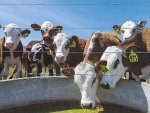Animal health company Zoetis is also working with Leptosure to promote the need for earlier vaccination this spring, and a road show is aimed at veterinarians, to lift vaccination programme awareness.
Leptospirosis is often mistaken by farmers for a bad bout of flu, but it can be almost entirely avoided if effective vaccination of livestock takes place.
Dr Roger Marchant, veterinary advisor to the New Zealand Veterinary Association’s (NZVA) Leptosure programme, is urging farmers to head off the risk of leptospirosis infection – for themselves, their family, their staff and their animals – by vaccinating animals at the right age.
“The typical pattern for leptospirosis vaccination has not changed much over the years. That’s been to vaccinate calves at about six months of age. However we can now be more specific about the timing and vaccination needs to be earlier than this to be fully effective.”
Farmers and veterinarians are in the front line for infection risk with about 120 reported human cases in New Zealand each year. However, as reported at the recent NZVA conference, estimates of under-reporting may mean the number of cases could be up to 40 times greater.
This rate puts New Zealand in the top bracket globally for serious human leptospirosis infections.
It is also a disease with insidious downstream affects through the rural community beyond the farm gate. Back in 2008 a meat worker died from the disease, and process workers have a 1:20 chance of contracting the disease through infected carcasses. The estimated annual incidence in veterinarians is 3%.
The Leptosure programme has previously recommended the practice of vaccinating at three to six months. However a revamp of the Leptosure guidelines is underway, with new ‘best practice’ vaccination standards coming out later this year. A key aim is to get vaccinations completed earlier before calves become infected, but not too early since maternal antibodies may interfere with the vaccine.
Concern over the mixed messages behind vaccinations prompted the NZVA to initiate a review by Massey University Epicentre on leptospirosis disease incidence.
This work reported on the possibility of increased risk of leptospirosis infections in herds where calves had not been vaccinated until six months of age.
A small pilot study by Massey showed 30% of apparently vaccinated herds sampled tested positive for leptospirosis, and 13% of cows in these herds could have been shedding the bacteria.
The risk of having a herd with one or more cows shedding leptospirosis bacteria appeared to be associated with the age at which calves were vaccinated for the first time.
Marchant said the ‘window of infection risk’ was there when vaccinations were not done until six months of age.
“An animal may well be infected with leptospirosis prior to that, and even if it does get vaccinated, that will not eliminate the infection.”
From the Massey review the Leptosure ‘best practice’ advice now is earlier vaccination than previously recommended, but not too early: for the average mob age of dairy calves the first vaccination needs to be about seven weeks of age on a farm with a high leptospirosis risk.
For a typical dairy farm that equates to 10 weeks after the seasonal start of calving as the earliest time, with a second shot administered four-six weeks after the first.
Even on low risk properties, farmers should aim to complete these two shots before 6 months of age.


















